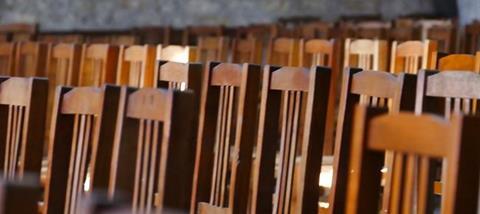
I’m surprised that senior bishops of the Church of England have joined with Christian Concern and individual pastors to request that churches remain open during the lockdown.
This seems to be a case of exceptionalism – “we need to be kept open because we are an exception to the rule”. It's not true that the government is telling churches to close down, which is how some have framed the debate. They are actually only telling churches to close their buildings to congregations gathering for church services. To put it another way: they are telling the church to work, as everyone else, from home.
For the first 300 years of the Church’s existence, all churches were based in someone’s home. We had no specific church buildings. So working from home wasn’t a problem – and if you needed more space, as Paul did, you hired a local meeting room like the Hall of Tyrranus (Acts 19:9).
But since taking over the basilicas under Constantine, we’ve become besotted with our buildings. Those arguing for churches to stay open seem to be saying that the Church is now exclusively a building. This is theological nonsense.
The Church of England is established within the state and part of the bonus of being established is the formal engagement and consultation that the government has maintained throughout the pandemic with church leaders. This is not an issue of persecution as some have falsely claimed. If the government wanted to close down churches for political reasons, we’d all be standing behind the communion rail and manning the barricades! But this is not that.
Opponents of the lockdown say humanity is called to worship God, and nothing should get in the way of this. They talk of the curtailment of ministry – worship, sacraments, prayer, healing. But surely all of this is possible online? Jesus famously healed from a distance, fed a hungry crowd in an open field, preached on a hillside (or from a boat), called forth Lazarus from a tomb and allowed a woman to be healed from bleeding while he walked around the village. Jesus shows God in the wild, not a God restricted to our buildings.
It seems strange that Paul’s exploration of the gathered church (ecclesia) is commonly interpreted to mean 'gathered in one physical place'. There were no church buildings when Paul used this phrase. Indeed, there is scant archaeological evidence for synagogue buildings in Galilee or Judea at the time of Jesus. People gathered in courtyard houses or the village square, under a suitable tree to provide shelter, in Solomon’s Portico or in people’s homes. Why is this not analogous with gathering online? Paul couldn’t do that – he didn’t have the technology. But I am sure he would have loved to deliver his own letters over Zoom, rather than ask others to take them around. He'd rather berate Philemon in person than send a letter.
During lockdown the bishops may have sought to highlight the psychological need of the people to meet together for the sake of their mental health, but again, we can do this better online. We can see one another, phone another, wave through the window as we pass. There is nothing stopping us being social. In fact, being social (sharing God) out in the wild doesn’t limit the benefit of the gathering to an hour on a Sunday morning. It doesn’t limit the benefit to the 5 per cent of the population who come to church on a Sunday. Taking the Church out into the wild, onto digital platforms, allows us to reach the 1 in 4 of the UK population who are engaging with organised worship online. We can reach five times the number of people through digital than through simply keeping our buildings open.
Of course, embeddedness into the local community is crucial – we need hybrid church (or ‘phygital’ church) not just ‘YouTube’ church. During the pandemic we should promote both online worship and fellowship as well as embodied local action: phoning the lonely, supporting the shielding, joining in volunteer support, showing love and care to key workers, especially NHS staff. We should be backing up online worship with other ways of engaging – paper worship materials posted to people, phone access to Zoom worship, buying simple tech to give to those without digital access (whatever their age). We should be providing what Professor Deanna Thompson calls a caring bridge to those in need. And we don’t need buildings. We can be caring bridges simply as ourselves.
This desperation to keep buildings open is also a slap in the face to those in our communities who cannot attend physical worship – the disabled, the long term ill, the vulnerable, the fearful. If we say the only credible way to worship God is to be in a building, we are failing to recognise how our buildings themselves are barriers to worship. Buildings can be thin places, sacred places, spiritual places. But even with ramps and rails, they can also be inaccessible places of bad memories, fearful places, cold places.
The body of Christ worships God wherever it is. The Church is not limited to worship in a building, we have a body/community ecclesiology not a temple ecclesiology. The Church has been doing this for millennia. The Mission of God, local and dispersed, has to transcend our buildings.
Pete Phillips is head of digital theology for Premier, but writes here in a personal capacity. He is the author of Hybrid Church and one of the organisers of the Premier Digital Conference which takes place on 14 November
Premier Christianity is committed to publishing a variety of opinion pieces from across the UK Church. The views expressed here do not necessarily represent those of the publisher



























